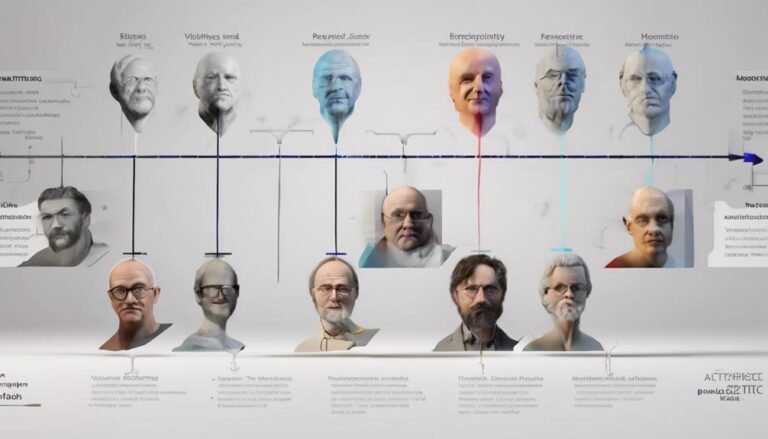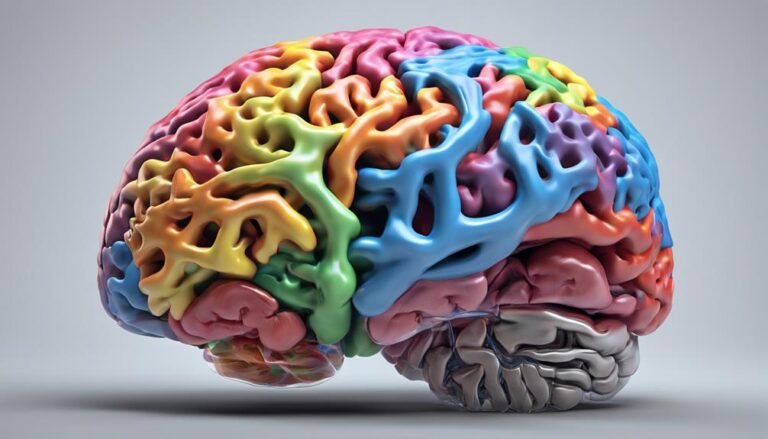Importance of Personality Psychology in Modern Science
In today's scientific landscape, the significance of personality psychology cannot be understated. As you explore the intricacies of human behavior and venture into the complex network of individual differences, you begin to uncover a domain where tailored interventions and strategies take center stage. But what truly sets this field apart is its far-reaching impact across various sectors, influencing everything from medicine to education to business. Stay tuned to discover how personality psychology is not just a puzzle piece but a cornerstone in unraveling the mysteries of human nature.
Key Takeaways
- Personality psychology analyzes behavioral patterns, revealing underlying motives.
- Understanding individual differences aids in predicting responses to stimuli.
- Tailored interventions based on personality enhance therapy effectiveness.
- Insights from personality traits benefit patient care outcomes in medicine.
- Personality psychology influences educational outcomes by allowing tailored teaching methods.
Understanding Human Behavior
To comprehend the complexities of human behavior, psychologists utilize various theories and research methods in the field of personality psychology. One key aspect that researchers focus on is the analysis of behavioral patterns. These patterns refer to the consistent ways in which individuals tend to act in various situations. By studying these behavioral patterns, psychologists can gain insights into the underlying motives and drives that influence human behavior.
Another essential element in understanding human behavior is the examination of personality traits. Personality traits are enduring characteristics that shape how individuals think, feel, and behave. Researchers in personality psychology often explore the link between specific traits and how they manifest in different behavioral patterns.
For example, someone high in extraversion may exhibit more outgoing and sociable behaviors compared to someone who's introverted.
Individual Differences Analysis
Examining individual differences through a comparative analysis of personality traits provides valuable insights into the unique ways in which people navigate the complexities of human behavior. By delving into behavioral patterns and personality traits, researchers can uncover the diverse ways individuals respond to stimuli, make decisions, and interact with others.
Behavioral patterns encompass the observable actions and reactions that individuals display in various situations. These patterns are influenced by a combination of genetic predispositions, environmental factors, and personal experiences. Understanding these behavioral patterns can aid in predicting how individuals may respond to specific stimuli or circumstances.
On the other hand, personality traits refer to the enduring characteristics that shape an individual's thoughts, feelings, and behaviors. Traits such as openness, conscientiousness, extraversion, agreeableness, and neuroticism provide a framework for understanding how individuals differ from one another.
Tailoring Interventions and Strategies
Tailoring interventions and strategies in personality psychology involves customizing approaches to address individual differences effectively. By implementing behavior modification techniques tailored to specific personality traits, therapists can enhance therapy effectiveness significantly.
Research has shown that individuals respond differently to various therapeutic interventions based on their unique personality characteristics. For example, individuals with high levels of openness to experience may benefit more from creative therapy approaches, while those with high conscientiousness may respond better to structured and goal-oriented interventions.
Furthermore, tailoring interventions based on personality traits can lead to more personalized and targeted treatment plans, ultimately improving therapy outcomes. Understanding how an individual's personality influences their behavior and response to therapy allows for the development of tailored strategies that cater to their specific needs and preferences.
Enhancing Fields Like Medicine
You can explore how personality psychology contributes to enhancing fields like medicine by improving medical diagnosis accuracy, leading to more precise treatment personalization for patients.
This enhancement not only benefits individuals by receiving tailored care but also fosters a stronger patient-provider relationship, ultimately improving health outcomes.
Understanding personality traits can offer valuable insights that revolutionize medical practices, making them more effective and patient-centered.
Medical Diagnosis Improvement
Advancements in personality psychology have greatly contributed to enhancing fields like medicine by providing insights into how individual traits can influence medical diagnosis accuracy. Understanding the psychological factors of patients plays an essential role in improving diagnostic accuracy and tailoring personalized treatment plans.
Personality traits such as neuroticism, conscientiousness, and openness can impact how individuals perceive and communicate symptoms, affecting the diagnostic process. Research shows that patients with certain personality traits may be more prone to somatic symptom expression, leading to potential misinterpretation of medical conditions.
By incorporating personality psychology into medical assessments, healthcare professionals can better account for individual differences in symptom presentation and enhance the accuracy of diagnoses. Moreover, personalized treatment plans that consider patients' personalities have been shown to improve patient care outcomes by addressing not only the physical aspects of illness but also the psychological and emotional needs of individuals.
Integrating personality psychology into medical practice can lead to more effective diagnosis and treatment strategies, ultimately benefiting patient care.
Treatment Personalization Benefits
Personalized treatment plans, informed by insights from personality psychology, have demonstrated significant benefits in enhancing various fields such as medicine. In mental health, tailoring treatment approaches based on individual personalities can lead to more effective outcomes. Research shows that individuals respond differently to various therapeutic interventions based on their personality traits.
By considering factors like extraversion, neuroticism, or openness to experience, mental health professionals can optimize treatment plans to better suit the unique needs of each patient.
Furthermore, personalized treatment plans not only improve the effectiveness of interventions but also enhance therapeutic benefits. When treatment aligns with an individual's personality characteristics, it can lead to increased engagement, motivation, and overall satisfaction with the therapeutic process. Patients are more likely to adhere to treatment recommendations when they feel that the approach resonates with their personality traits, ultimately leading to better outcomes.
Patient-Provider Relationship Enhancement
Enhancing the patient-provider relationship is vital for improving outcomes in various fields like medicine. Improved communication and empathy training play significant roles in strengthening this relationship.
Research shows that when patients feel understood and supported by their healthcare providers, they're more likely to adhere to treatment plans, experience better recovery rates, and report higher levels of satisfaction with their care.
Effective communication involves active listening, clear explanations of medical information, and fostering a collaborative decision-making process. Empathy training helps providers understand the emotional needs of patients, leading to enhanced trust and rapport.
Studies have demonstrated that providers who demonstrate empathy towards their patients can positively influence health outcomes and overall well-being.
Impact on Education
Personality psychology's impact on education is profound; it influences educational outcomes and allows for tailored teaching methods.
By understanding students' personalities, educators can cater to their individual needs, enhancing their learning experiences.
This personalized approach fosters better academic performance and student engagement in the classroom.
Educational Outcomes Influenced
Research in personality psychology has shown significant influences on educational outcomes, impacting various aspects of the learning process and academic achievement. One key area where personality traits play a vital role is in academic performance. Studies have revealed that traits like conscientiousness and openness to experience are positively correlated with higher academic success. Individuals who exhibit traits such as perseverance, organization, and a willingness to learn tend to perform better in their studies and achieve higher grades.
Moreover, personality psychology also plays a significant role in shaping career choices. For instance, individuals with high levels of extraversion may be more inclined towards careers that involve social interaction, such as sales or public relations. On the other hand, those with a strong preference for analytical thinking, linked to traits like openness and agreeableness, may be more drawn to professions in research or academia.
Understanding how personality influences career preferences can help individuals make more informed decisions about their future paths.
Teaching Methods Tailored
Understanding how personality traits impact educational outcomes can lead to the development of teaching methods tailored to individual students' needs and learning styles. By implementing interactive workshops and group discussions, educators can cater to extroverted students who thrive in social settings. These methods encourage collaboration, communication, and active participation, creating a conducive learning environment for students with outgoing personalities.
In contrast, utilizing case studies and role-playing simulations can benefit introverted students who prefer independent work and reflection. These activities allow introverted individuals to engage with the material at their own pace, encouraging deep thinking and analysis.
By incorporating a mix of these tailored teaching methods, educators can better cater to the diverse range of personality traits present in any classroom.
Research suggests that personalized teaching approaches based on personality psychology can enhance student engagement, motivation, and overall academic performance. By acknowledging and adapting to students' unique traits, educators can create a more inclusive and effective learning experience for all individuals.
Relevance in Business
Examining the application of personality psychology in business settings can provide valuable insights into employee behavior and performance. When it comes to leadership development, understanding the personalities of leaders and how they interact with their teams is essential.
Research shows that effective leadership aligns with certain personality traits, such as openness, conscientiousness, and emotional intelligence. By utilizing personality assessments, businesses can tailor leadership development programs to enhance these key traits, ultimately leading to more successful and impactful leaders.
Employee engagement is another critical aspect where personality psychology plays a significant role. Studies have indicated that employees who feel their personalities are well-suited for their roles exhibit higher levels of engagement and job satisfaction.
Advancing Research in Science
By delving into the intricate connections between personality traits and scientific endeavors, a deeper understanding of human behavior and its impact on research outcomes can be achieved. Research collaboration plays an essential role in advancing scientific investigations. When individuals with diverse personality traits come together to work on a research project, they bring different perspectives, skills, and approaches to the table. This diversity in personalities can lead to more thorough analyses, innovative ideas, and better problem-solving strategies.
Furthermore, the interpretation of data in scientific research is heavily influenced by the researchers' personalities. For instance, individuals with high levels of openness may be more inclined to explore unconventional data interpretations, potentially leading to groundbreaking discoveries. On the other hand, individuals with a strong attention to detail, such as those high in conscientiousness, may excel in meticulously analyzing complex datasets.
Insights Into Human Nature
Researchers gain valuable insights into human nature through the study of personality traits and their impact on scientific endeavors. By delving into personality traits analysis, researchers can uncover patterns in behavior that shed light on how individuals interact with their environment. Understanding behavior patterns aids in predicting responses to various stimuli and situations, contributing to more accurate scientific outcomes.
Moreover, the exploration of emotional intelligence provides researchers with a deeper understanding of how individuals perceive and manage emotions, influencing their decision-making processes. Through this exploration, insights into cognitive processes emerge, revealing how emotions impact reasoning and problem-solving abilities.
Conclusion
As you explore the intricate web of personality psychology, envision a kaleidoscope of human behavior, individual differences, and tailored interventions.
Like a masterful painter blending colors on a canvas, personality psychology enriches modern science with its insights, predictions, and personalized approaches.
Embrace the diverse collaborations and innovative ideas within this field, for they hold the key to revealing deeper understandings of human nature and shaping a brighter future for all.







